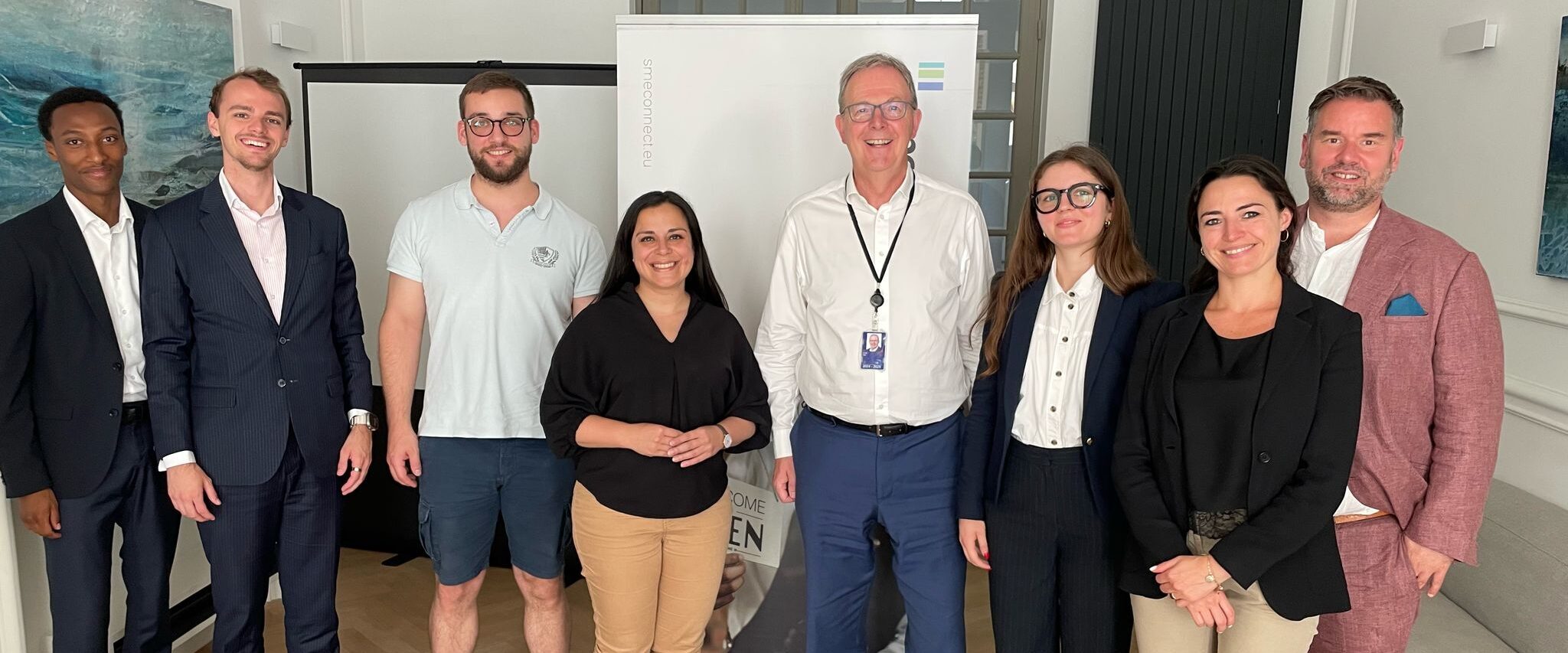Working Group ADC Kicks Off 2025:
Artificial Intelligence, Data Economy and Cybersecurity

Working Group Launches 2025 Agenda: SME Connect Working Group on Artificial Intelligence, Data Economy & Cybersecurity
On 3 July 2025, SME Connect’s Artificial Intelligence, Data Economy & Cybersecurity Working Group held its first session of the year, chaired by Member of the European Parliament Axel Voss and co-chaired by former MEP and SME Connect Special Advisor Josianne Cutajar — both leading voices in the EU’s AI legislative landscape. The meeting gathered entrepreneurs, academics, public policy leaders, and AI specialists to examine how the evolving European regulatory framework intersects with innovation, SME competitiveness, digital sovereignty, and societal protection. The discussion provided a timely platform to assess the implementation challenges of the AI Act, explore liability gaps, and share practical use cases to support small businesses in the age of artificial intelligence.
A Fragmented Landscape: Urgency and Uncertainty in EU AI Regulation
The session opened with an in-depth briefing on the legislative landscape. While the AI Act has entered into force, its practical application remains uncertain — particularly around provisions for high-risk systems and interactions with existing laws such as the GDPR. The importance of the forthcoming “digital omnibus,” expected in Q4 2025, was emphasized, as it aims to streamline overlapping digital regulations, reduce administrative burden, and ensure coherence between AI, GDPR, and other frameworks. However, delays in the Code of Practice, limited institutional clarity, and varied national interpretations are leaving many SMEs confused. The legislative process must be accompanied by actionable guidance and realistic timelines to avoid further widening the implementation gap.
AI Liability: The Missing Link in a Digital Single Market
One of the most contentious topics was the European Commission’s proposed withdrawal of the AI Liability Directive. This move could leave Europe with 27 fragmented national regimes — creating high legal uncertainty and undermining the Digital Single Market. While the Product Liability Directive provides some coverage, it fails to address many modern risks, such as bias, discrimination, or misuse of generative AI systems. MEP Voss highlighted that a pan-European regulatory solution was advocated, ideally complemented by a mandatory insurance model for high-risk AI systems — mirroring frameworks like car insurance. This would protect users and developers without stifling innovation.
Generative AI and Copyright: Bridging the Legal Gap
The Working Group also addressed the copyright challenges posed by generative AI. The current application of Article 4 of the 2019 Copyright Directive — which allows free text and data mining — was considered unfit for today’s large-scale model training. Interim remuneration schemes for rights holders and longer-term licensing solutions were proposed to ensure that Europe’s creative industries are fairly compensated. Without action, the misuse of copyrighted works for AI training could harm one of Europe’s most valuable sectors. A new initiative report in the JURI Committee is expected to push for legislative clarity on this issue.
Protecting Democracy, Children, and Mental Health
The conversation broadened to highlight the societal consequences of unchecked digital environments. Discussions included potential restrictions on social media access for minors, and the links between addictive digital behavior, mental health issues, and democratic erosion. Without proper governance of algorithms, disinformation, manipulation, and addictive content may continue to erode public trust and civic resilience. While reaffirming the importance of fostering AI innovation, the Working Group also committed to examining its societal risks — especially for vulnerable groups such as children and adolescents.
Bridging the AI Adoption Gap for SMEs
Participants showcased a range of AI solutions tailored for SMEs — including compliance agents, funding access tools, privacy assistants, and lean automation platforms. Despite this growing ecosystem, AI adoption among the EU’s smallest businesses remains strikingly low — below 15% EU-wide. This gap is not due to a lack of potential — but rather to the absence of accessible tools, technical resources, and practical legal support. Policymakers must urgently address the “awareness and resources” gap preventing smaller firms from implementing the AI Act. Without proactive outreach, training, and simplification, many SMEs risk being left behind in Europe’s digital transition.
Conclusion: Towards a Balanced, Competitive, and Human-Centered AI Future
The relaunch of SME Connect’s Working Group on AI made clear that the road ahead requires both vision and vigilance. With strong leadership and strategic guidance, the group is serves as a bridge between legislation, innovation, and the real needs of SMEs. As the AI Act moves from adoption to enforcement, we will remain a vital platform to clarify rules, identify challenges, and empower Europe’s entrepreneurs in building a competitive and human-centered AI ecosystem. The meeting closed with a call for more inclusive dialogue and targeted support for Europe’s SME ecosystem.

Contact | t.viires@smeconnect.eu | Working Group Coordinator